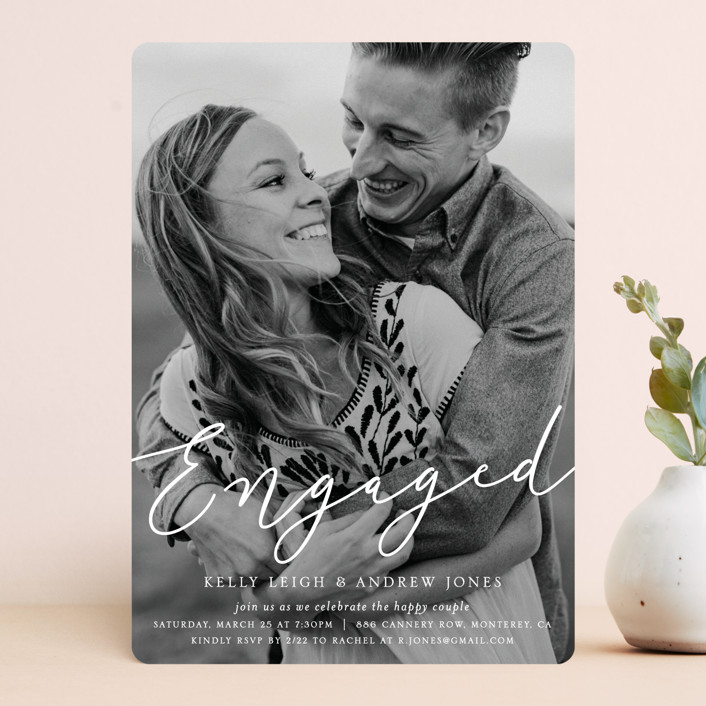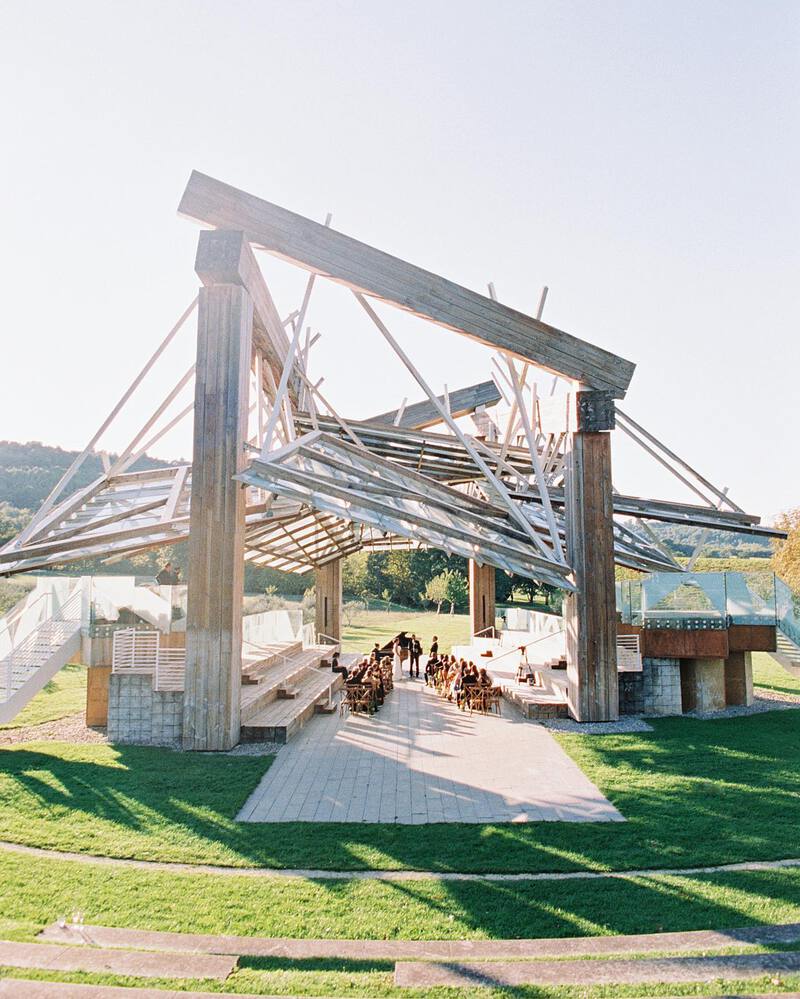Getting engaged is one of the most exciting times of your life. And as you share the happy news with your nearest and dearest, it is easy to get swept away in planning your dream wedding. But before you make any big decisions, first things first: setting your wedding budget.
Determining your wedding budget is the most important part of wedding planning because it will affect every decision and purchase you make from now until your big day.
Setting a wedding budget can feel overwhelming, and while there is certainly a lot to consider, it doesn’t need to be stressful. Which is exactly why we’ve created this article. In it, we'll go over everything you need to know about wedding budgets, including typical wedding budget breakdowns, what your wedding budget needs to account for, sample budget, and the best tips and strategies for stretching your budget as far as it will go. So pull up a spreadsheet and let’s get started.

Photo by Leah Gunn
What You Need to Know Before You Make Your Budget
WHO IS CONTRIBUTING TO THE WEDDING
Are you and your spouse-to-be going to fund the whole wedding by yourselves? Or do you have family or even close friends who want to pay for part of the wedding? And if so, how much are they offering to give you? Getting clear on the answers to those questions is one of the most important first steps in creating your budget, as it will give you a clearer idea of the total amount of money you have to work with.
Pro tip: If someone is offering to contribute to your wedding fund, be sure to get clear on if that person has any opinions about how they want that money to be spent. For example, your uncle may want to pay for your florals, while your grandparents may be happy to contribute a lump sum to your budget that you can use however you want.
WHAT YOU CAN ACTUALLY AFFORD
When getting clear on how much you and your partner will personally contribute to the wedding, it is super important to understand what you can actually afford to spend. Life comes at you fast and other crucial expenses won’t magically disappear while you’re wedding planning (unfortunately!).
When determining your budget, be sure to factor in both daily expenses such as rent or mortgage, car payments, or debt you might be paying off as well as costs on the horizon such as a down payment on a home, medical expenses, or even other weddings you’ll be attending. Doing so will help you create a more realistic wedding budget, and will make sure you aren’t overextending yourself where it really counts.
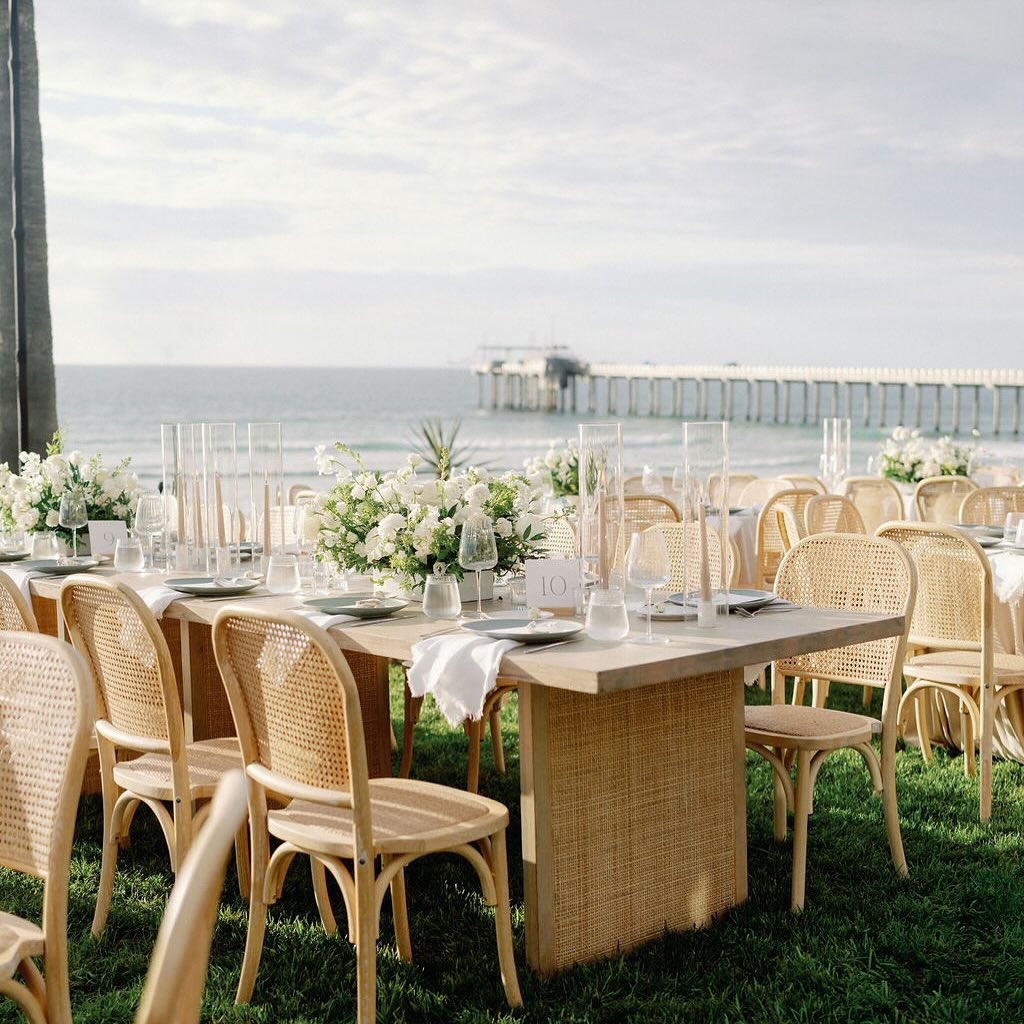
Photo by Alicia Mink
WEDDING PRIORITIES
Do you already know your guest list will be at least 200 people? Want a designer gown? Have a florist in mind already? All of those priorities come with a cost.
What is important to you on your wedding day is going to be different from what your best friends prioritized at their weddings, what your family members want, and even what your spouse-to-be wants out of the experience. So be sure to sit down and have open and honest discussions about what your must-haves are, and what you’re comfortable leaving off as you build your budget. This will allow you to shrink or expand how much you spend in certain areas, to make your budget work for you…no matter how much money you have to spend.
WHAT WEDDINGS INCLUDE
If you’ve never planned a wedding before, it can be hard to imagine just how many little details go into making the big day happen…let alone how much each of those things cost! Doing your research in advance about what weddings typically include (which we’ll get into a little later on in this article) can be super helpful as you build out the line items on your budget, and can help you identify some of those priorities we just discussed, too.
What is A Realistic Budget for a Wedding?
It should come as no surprise that wedding budgets vary wildly. Some couples spend well over $100,000 on ultra-glamorous big days, while others throw the wedding of their dreams for $5,000.
That being said, the average cost of a wedding in the United States in 2025 is $33,000. But just because that number is the average, doesn’t necessarily mean it is a realistic budget for you. For example, weddings in states like Rhode Island, New York, and California typically cost more than the average, while weddings in states like Utah, Kentucky, and Alaska cost less. Furthermore, the type of wedding you want to throw, the time of year you’re hoping to have it, and how many guests you’d like to include will all have an impact on what a “realistic” wedding budget might be.
This is why it is so important to do the prep work we discussed in the section above to get clear about what you can spend making your dream wedding come to life.
Wedding Budget Breakdown
To help you figure out how much you’ll need to allocate for the various aspects of the celebration, such as catering, attire, flowers, music, etc., we’re sharing the average wedding budget breakdown below.
Keep in mind, though, that these are just averages, which is why the percentages in this list don’t add up to 100. How you choose to divvy up your own wedding budget is entirely up to you (along with whoever else is paying for the wedding). You may choose to spend more or less in certain areas, and that’s totally fine. Your wedding costs, and the amount of budget you allocate to each, will also vary depending on where you’re getting married and the size of your guest list.
But use these average wedding budget percentages as a starting point and then customize them to create your own.
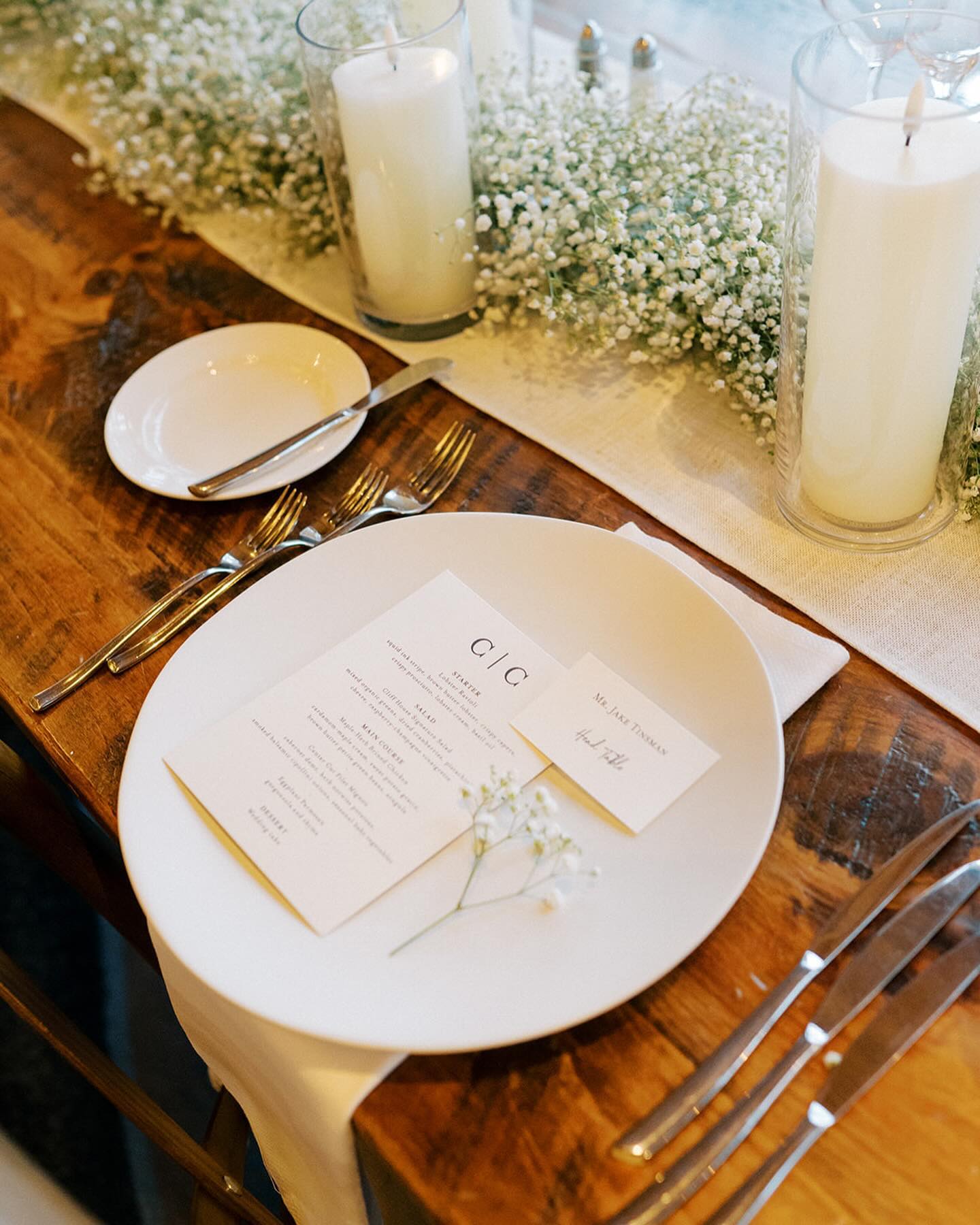
Place Cards and Menu Cards by Minted
Photo by The Leighton Co.
RECEPTION VENUE, CATERING, & RENTALS (45%)
While most line items on your wedding budget can be flexible, your venue, catering, and event rentals are your must-haves. And because they are so important, the majority of your budget should go towards covering those costs. These may include:
- Venue. The bulk of your rental budget will go towards your reception rental, but it may also include your ceremony space if everything is happening on the same property.
- Rentals. This includes things like tables, chairs, linens, stemware/glassware, flatware, china, tenting, etc. (Note that this is separate from any decor rentals — consider these items your “must haves,” while decor rentals such as fun furniture vignettes should be budgeted under “nice to haves.”)
- Catering. Your catering budget should include food for dinner and cocktail hour, as well as service costs for catering staff.
- Bartending. This will include service, alcohol, custom cocktails, etc.
WEDDING PLANNER/COORDINATOR (5-15%)
While not every couple opts to hire a wedding planner or coordinator, it is definitely worth considering making space for one in your budget. Many venues require at least a day-of coordinator on your wedding day — that way you’re free to focus on getting yourself ready instead of frantically arranging centerpieces — so be sure to look at your contracts closely.
Hiring a wedding planner can also help you save money and stretch your budget further in the long run, as they’ll be able to leverage their relationships with vendors to get you the best price possible. They’ll also be able to help you understand what details will and won’t make a big impact on your day, helping you avoid overspending on unnecessary items.
To learn more about how much to expect to pay for a wedding planner, check out our full guide here.
CEREMONY (3%)
A portion of your budget should be allotted for the wedding ceremony; specific costs might include:
- Ceremony venue, if separate from your reception venue
- Ceremony rentals, such as chairs/benches for guests to sit on, an altar, etc.
- Marriage license
- Officiant
- Ceremony music
PHOTOGRAPHY AND/OR VIDEOGRAPHY (12%)
Great wedding photos are a must, so this isn’t something you’ll want to skimp on — which is why it gets such a large chunk of your budget. Some couples opt out of videography in order to save money, but be sure to consider whether you’ll regret not having this memento to watch later down the road.
- Photography. Your budget will likely cover a photographer and a second shooter, any travel costs for them to get to your venue, as well as an engagement photoshoot.
- Videography. The cost for videography will include all of the same things we just listed under photography, as well as different cuts of your wedding video (such as a full video, a highlight reel to share on Instagram, etc.)
RECEPTION MUSIC/ENTERTAINMENT (10%)
This is where you bring the party to life! Think of this as everything you need to ensure your guests have a great time during your cocktail hour and reception. For most couples, the entirety of this budget will go to your party soundtrack, but this could also include fun extras like a live cellist, a photobooth, a sketch artist, and more.
- Band. While typically more expensive than DJs, there’s nothing like a live band to get people on their feet.
- DJ. In addition to providing a soundtrack for the night, DJs will also often serve as an MC for the evening. They’ll help transition the party from one phase to the next, get tables to the buffet in an organized way, and more.
- Cocktail hour musicians. If you’d like live music during cocktail hour, be sure to leave some wiggle room in your budget to bring them on.
- Photobooths. Outside of music, this is the most common entertainment-related expense that couples include in their wedding budget. Photo Booths can vary in cost depending on how elaborate their set up is (a 360-style glambot will cost more than a standard backdrop and automated camera, for example).
- Fun experiences. Do you want to have a poet on standby to write odes to your guests? Or maybe someone doing caricatures? Be sure to include that in this portion of your budget if so.
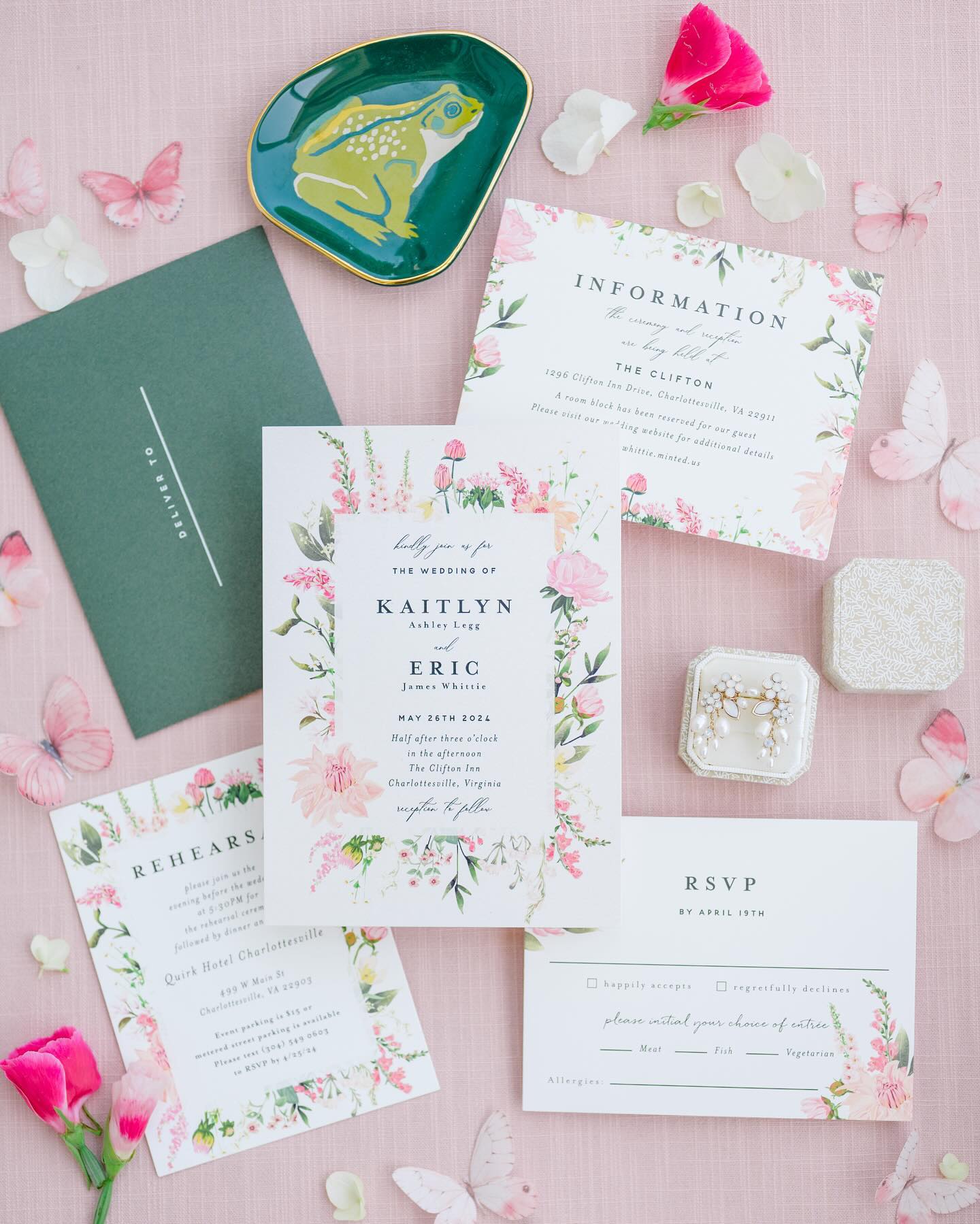
Minted Invitation Suite: Lush by Susan Moyal
Photo by Cait Kramer
STATIONERY (3%)
This portion of the budget should cover all of your wedding stationery, from engagement announcements and save the dates to escort cards and thank you notes.
- Engagement announcements
- Save the dates
- Invitation suite, including RSVP and additional details cards
- Other stationery pieces, including ceremony programs, menus, escort cards, place cards, table number signs, etc.
- Stationery embellishments, such as wax seals, vellum, belly bands, calligraphy, etc.
- Thank you cards
- Postage
FLOWERS & DECOR (10%)
If there’s one area where it is easy to quickly blow your budget, it is this one. Especially because most couples don’t have a great understanding of just how much that floral arch you’ve been pining after on Pinterest costs.
On the whole, we recommend allocating 10% of your overall budget to flowers and decor. This includes personal bouquets as well as ceremony decorations, cocktail hour florals, centerpieces, and other non-floral decorations.
- Flowers. Again, this includes the bouquets the wedding party will hold during the ceremony, any other florals that will be in the ceremony space, as well as reception florals such as centerpieces and ceiling installations.
- Lighting. This is one of those areas that is so easy to overlook, but can make a big difference! Do you want a spotlight on you as you do your first dance? A disco ball? Or romantic candles softly illuminating the space? Be sure to allocate some money for each.
- Miscellaneous decor. This category includes all of the remaining decor details. Think your guest book (as well as pens for your guest book), ring pillow, frames for photos, and additional furniture rentals like fun chairs for the head table, a lounge vignette for guests to hang out around, etc.
WEDDING ATTIRE & BEAUTY (9%)
This portion of your b budget should cover both of your wedding-day looks, day-of hair and makeup (as well as any beauty treatments you plan to get done in the run-up to the wedding) as well as any attire and services you plan to cover for your wedding party.
- Attire. This includes wedding dresses, wedding suits, second looks (if you plan to change), as well as getting-ready outfits.
- Alterations. This is an area that is easy to overlook when building your budget and buying your wedding dress or suit. Be sure to factor in plenty of money to ensure they fit you perfectly.
- Accessories. Think shoes, veil, extra jewelry, tie, pocket squares, etc.
- Day-of Hair & Makeup
- Beauty Prep. This can include manicures, hair cuts/coloring sessions, facials, and any makeup or skincare you plan to purchase on your own.
WEDDING RINGS (2%)
Don't forget to budget for your wedding bands! You might also want to consider allocating funds for wedding ring insurance.
- Wedding bands
- Ring insurance (For more on this, read our guide to engagement ring insurance.)
- Ring box
FAVORS & GIFTS (2%)
Wedding favors are a sweet way to send guests home with a parting gift. And don’t forget gifts for your wedding party members to thank them for helping you prepare for the wedding day.
- Favors for guests
- Gifts for the wedding party
- Welcome bags
CAKE (2%)
The catering costs we covered above typically don’t include your cake or dessert, so don’t forget to make space for sweet treats in your budget!
- Wedding cake. In addition to the cake itself, you should also ask your venue or caterer if they charge a cake-cutting fee. If so, be sure to build your budget to anticipate that additional cost.
- Desserts or cake alternatives. Because wedding cakes can be expensive, many couples are opting to skip it and offer a dessert bar instead. If that is the route you take, be sure to include that cost in your budget.
TRANSPORTATION (2%)
Hiring transportation services ensures that everyone gets to where they need to be safely and on time. This may include:
- Newlyweds’ getaway car
- Wedding-party transportation to and from the ceremony, reception, and lodging
- Guest transportation to and from the ceremony, reception, and lodging
- Parking or valet services
ADDITIONAL CONSIDERATIONS
Everything we just covered will go a long way towards helping you build out a comprehensive wedding budget. But that said, there are a few sneaky costs that you should be aware of so you don’t accidentally go overboard. Here are a few extras to consider:
- Tips: 5-15%. Many of your vendors will expect to be tipped. Some will have it written into their contracts, and some won’t, so it is a good idea to build in a bit of a buffer for tips that will get handed out on the big day.
- Just-in-case fund: 5–15%. It’s a good idea to have some wiggle room in your budget to pay for unexpected expenses such as an emergency rain tent.
- Rehearsal dinner and other wedding events: 8%. If you’re hosting a welcome party, rehearsal dinner, or goodbye brunch, be sure to factor those expenses into your overall budget.
- Honeymoon: 5%. If you plan to jet off on your honeymoon directly after the wedding, be sure to account for that cost in your overall budget!
Budget Examples
So how does that wedding budget breakdown actually work in real life? Here, we’ve put together a few wedding budget examples at various price points, using the percentages listed above.
Keep in mind that these percentages can be adjusted depending on your wedding size, priorities and needs.
$10,000 WEDDING BUDGET BREAKDOWN
In this example, it may make sense for the couple to skip things like favors or opt to skip a DJ and DIY their own wedding playlist in order to bulk up their budget in other areas that may be more important to them.
- Ceremony: $300
- Reception, venue, catering, and rentals: $4500
- Photography and/or videography: $1200
- Reception music/entertainment: $1000
- Wedding rings: $200
- Wedding attire: $900
- Flowers & decor: $1000
- Stationery: $300
- Favors & gifts: $200
- Cake: $200
- Transportation: $200
$20,000 WEDDING BUDGET BREAKDOWN
- Ceremony: $600
- Reception, venue, catering, and rentals: $9000
- Photography and/or videography: $2400
- Reception music/entertainment: $2000
- Wedding rings: $400
- Wedding attire: $1800
- Flowers & decor: $2000
- Stationery: $600
- Favors & gifts: $400
- Cake: $400
- Transportation: $400
$30,000 WEDDING BUDGET BREAKDOWN
- Ceremony: $900
- Reception, venue, catering, and rentals: $13500
- Photography and/or videography: $3600
- Reception music/entertainment: $3000
- Wedding rings: $600
- Wedding attire: $2700
- Flowers & decor: $3000
- Stationery: $900
- Favors & gifts: $600
- Cake: $600
- Transportation: $600
$50,000 WEDDING BUDGET EXAMPLE
- Ceremony: $1500
- Reception, venue, catering, and rentals: $22500
- Photography and/or videography: $6000
- Reception music/entertainment: $5000
- Wedding rings: $1000
- Wedding attire: $4500
- Flowers & decor: $5000
- Stationery: $1500
- Favors & gifts: $1000
- Cake: $1000
- Transportation: $1000
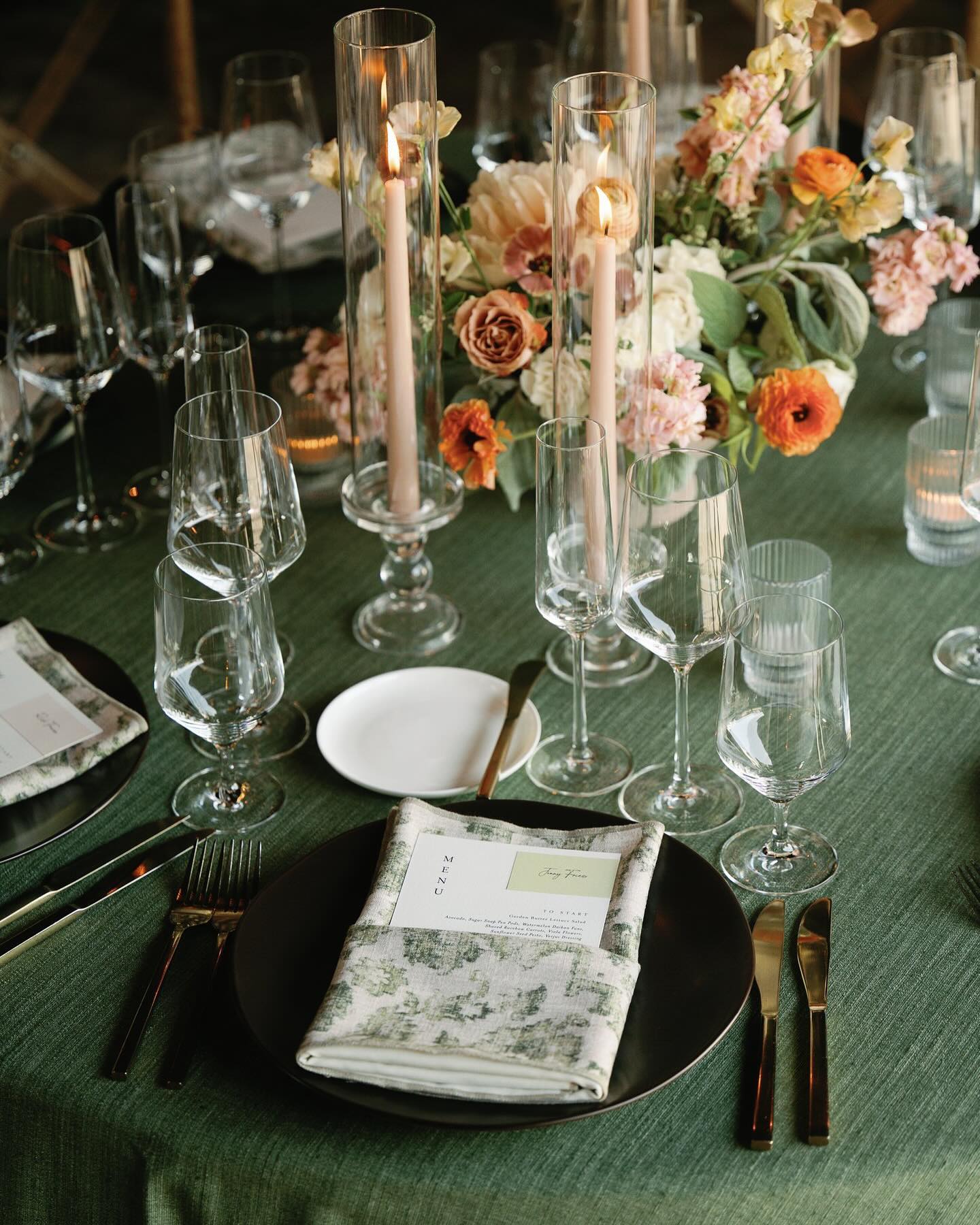
Photo by Becca Howland
Budget Pro Tips & Considerations
SET UP A BUDGET TRACKER TO STAY ORGANIZED
It’s crucial to track every penny spent on the wedding, including standard expenses, taxes, and tips. A few tips to help make tracking your spending easier are:
- Make a spreadsheet or use a budget app to track your expenses
- Open a joint savings or checking account specifically for wedding expenses
- Ask for all taxes and fees from vendors upfront
- Budget for vendor tips in the beginning
DON’T BE AFRAID TO TAILOR YOUR BUDGET TO YOUR NEEDS AND PRIORITIES
The list of common wedding expenses, and how much you should allocate to each, are simply averages meant to serve as a helpful guide. How much you spend — and if you choose to spend on them at all — is completely up to you.
Having a really clear picture of what you need out of your big day can go a long way towards keeping you on track with your overall budget, and help you feel good about the compromises you’ll inevitably have to make. So don’t be afraid to skip “necessities” like a videographer or wedding cake if you know it won’t add to your experience — you’ll be much happier having used that money on something more important to you.
BAKE IN A LITTLE EXTRA FOR HIDDEN COSTS
Making a detailed budget will allow you to see where your funds need to be spent. There is always the possibility, however, that things will change for one reason or another along the way and what you initially budgeted for ends up costing significantly more.
Setting aside money for unforeseen expenses is the best way to be prepared for anything that changes from the original budget. A good number to shoot for is around 5-15% of your total budget amount.
This buffer will also help ensure you don’t blow your budget on hidden expenses that come along with wedding planning. These can include things like…
- Hair and makeup trials
- Floral trials/additional meetings with your florist
- Food and drink tastings
- Delivery fees
- Bachelor/bachelorette parties
- Bridal showers
- Travel to and from your venue during the planning process (something that is especially important to consider if you are having a destination wedding!)
USE CREDIT CARDS WISELY
As a general rule of thumb, nothing should be charged to credit that can’t be paid off in 30 days. It can be very appealing to put some big expenses on a credit card so you don’t take that financial hit right away. This will end up costing you more in the long run.
Using credit cards to pay for wedding expenses when you have the money to pay them off is a good move. This way you can take advantage of rewards such as cash-back, or use the points you earn to pay for a significant chunk of your honeymoon. Just remember to pay them off!
FIND WAYS TO SAVE
Sometimes, sacrifices have to be made in order to cut costs and stay within budget. This is where that priorities list that you made will come in handy. Stick to the must-haves and be prepared to compromise if needed.
A few ways that you can cut costs are:
- Cutting down the guest list
- Choosing a less expensive venue
- Renting clothing/jewelry as opposed to buying
- Going for minimalist decor
- Choosing affordable wedding stationery
Choosing to skip a live band or a larger-than-life floral installation may feel painful in the moment, but remember, your wedding is just one day of your life. And while it is certainly important and worth spending money on, no one wants to go broke because of their wedding!
UNDERSTAND HOW STYLE IMPACTS COST
One of the most important things to do early on in the wedding planning and budgeting process is to ensure that the wedding you’re envisioning in your head actually matches your wedding budget. For example, formal weddings tend to cost more than those that are more casual. The same goes for weddings dripping in florals.
That’s not to say you can’t pull off a classically beautiful wedding on a smaller budget, but having a good sense of what you can actually afford to spend on your big day should be your guiding light when it comes to design decisions.
CREATING YOUR WEDDING BUDGET: A STEP-BY-STEP GUIDE
1. SET AN ABSOLUTE LIMIT
This must be an absolute limit that you can and will not go over for any reason. There are always ways to cut costs, so setting this limit will let you know when it’s time to start cutting.
To set this limit, think back to how much you have in savings that you’re willing to dedicate to your wedding, how much you can put towards the wedding as you’re planning, and how much you’ll be receiving from friends and family.
2. MAKE YOUR BUDGET BREAKDOWN
Making a comprehensive breakdown of expenses is a must. This will allow you to come up with a budget for all wedding expenses.
We have provided sample breakdowns and average percentages in this article. It is important to remember that these are just estimates and that your breakdown may be slightly different! To create your own breakdown, you’ll first need to make a list of priorities. We recommend doing this by having you and your partner make a separate list of priorities, and then compromising to come up with your shared must-haves. Then, go through your budget section-by-section to set realistic limits for each area.
3. DETERMINE WHO WILL PAY FOR WHAT
Every family is different when it comes to paying for weddings. Some go the traditional route of the bride's family paying for the majority of the wedding. While others pay for themselves or even get help from the groom's family instead.
Regardless of who decides to help with expenses, if anyone, it helps to know this before creating a budget. You should not rely on receiving monetary gifts while making a budget, however, if a relative offers to pay for something in particular it helps to factor that into the budget.
4. INCLUDE AN “EXTRAS” FUND
This is the cash you set aside for a rainy day in your wedding planning journey. Be diligent about protecting this pool of money to save in case you need to hire a last-minute vendor, make a change, or discover you had underestimated the true cost of one of the must-haves on your wedding budget.
5. FIND WAYS TO SAVE
There are countless ways to save money on your wedding. From the invitations to the vendors at the reception, you don’t have to spend top dollar on everything in order to have the perfect wedding.
Make sure to shop around for the most cost-effective option every step of the way. And being “thrifty” is not a bad thing at all, reusing/repurposing can be a big money saver for you.
Remember little savings here and there will add up in the end. So save where you can and don’t be ashamed of it, knowing that you aren’t putting yourself into debt with your wedding will make it that much more perfect.
Wedding Budgets FAQ
1. How should we determine our total wedding budget?
Start by identifying who will contribute and how much. Consider your financial capacity and discuss contributions with any family or friends who may wish to help.
2. What are some realistic expectations for a wedding budget?
As mentioned, the average wedding cost is around $33,000, but this varies widely based on location, guest count, and style. It's essential to tailor your budget to your individual circumstances.
3. What is a typical wedding budget breakdown?
Recapping the above, allocate approximately 45% for the reception, venue, and catering, 12% for photography, 10% for entertainment, 10% for decor and flowers, and the remainder for attire, stationery, and other essentials.
4. How can we prioritize spending within our budget?
Determine your must-have and negotiable elements. Prioritize what means the most to you and adjust spending on other aspects accordingly to stay within budget.
5. How do we handle unexpected wedding costs?
Allocate a buffer of 5-15% of your budget for unforeseen expenses, such as additional decor or vendor tips.
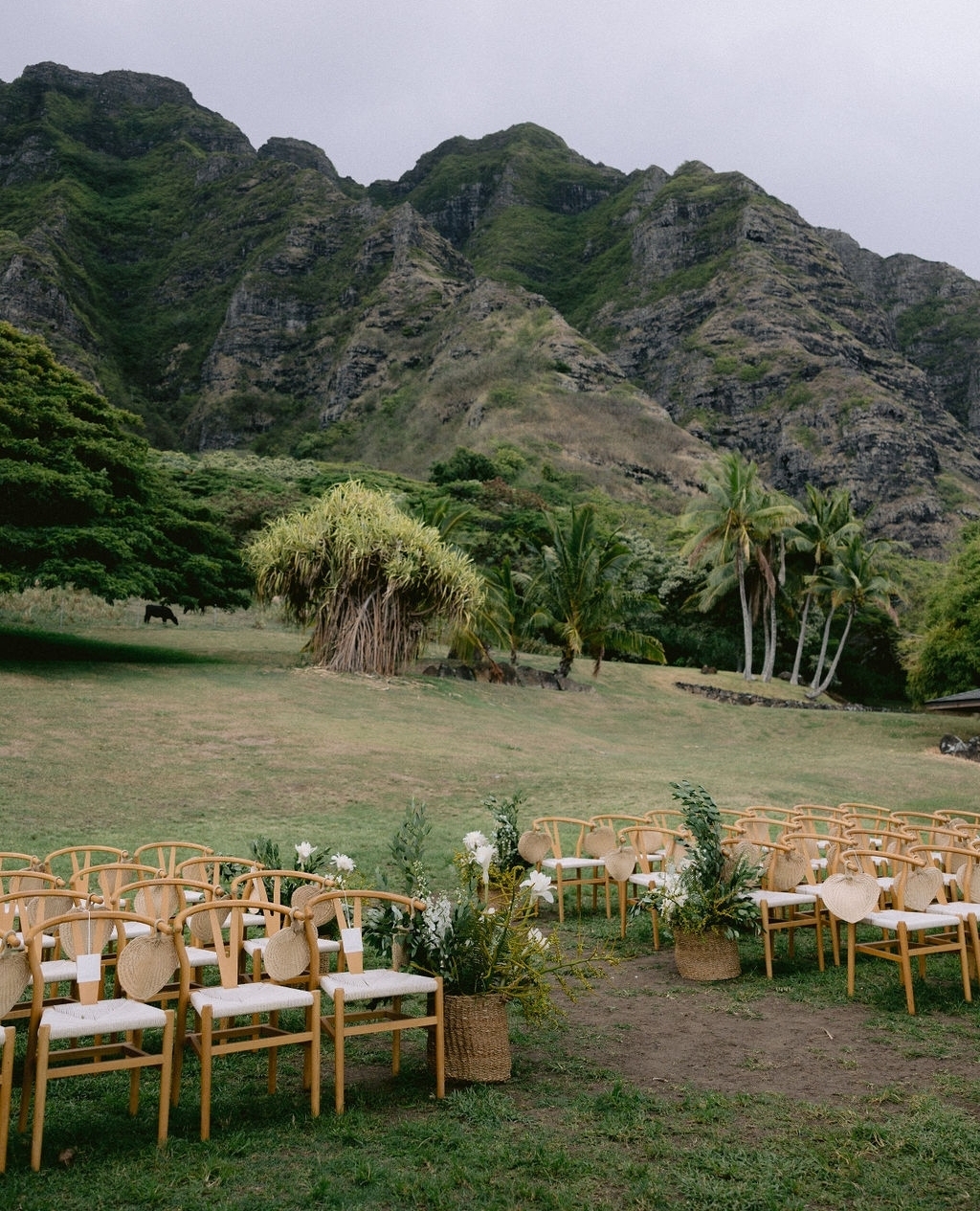
Photo by: Sofia Theresa Photo
6. Should we consider hiring a wedding planner within our budget?
A planner can be beneficial, often saving money in other areas by negotiating with vendors. Budget 5-15% for planning services, especially if your venue requires a day-of coordinator.
7. What are some ways to cut wedding costs?
Consider reducing the guest list, opting for less formal venues, and selecting minimal decor. Be mindful of clothing rentals and DIY elements.
8. How should we manage payments and track expenses?
Utilize a wedding-specific bank account and a spreadsheet or budgeting tool. Clearly outline all costs, including vendor fees and taxes, to prevent overspending.
9. Is it wise to use credit cards for wedding expenses?
Use credit cards strategically to take advantage of rewards, but only if you can pay off balances immediately to avoid interest charges.
10. What should we consider when deciding on the overall style of our wedding?
Understand that formal and floral-heavy weddings cost more. Choose a style that aligns with your vision and financial means to ensure a satisfying planning process.
We hope this article gave you the information you need to begin building a wedding budget that feels right for you and your partner. Remember, like with all things wedding planning, how you choose to approach how much you spend on your big day is a completely personal decision. And as long as you stay true to what you and your partner want (and don’t spend beyond your means), you’ll have made the right decision!



